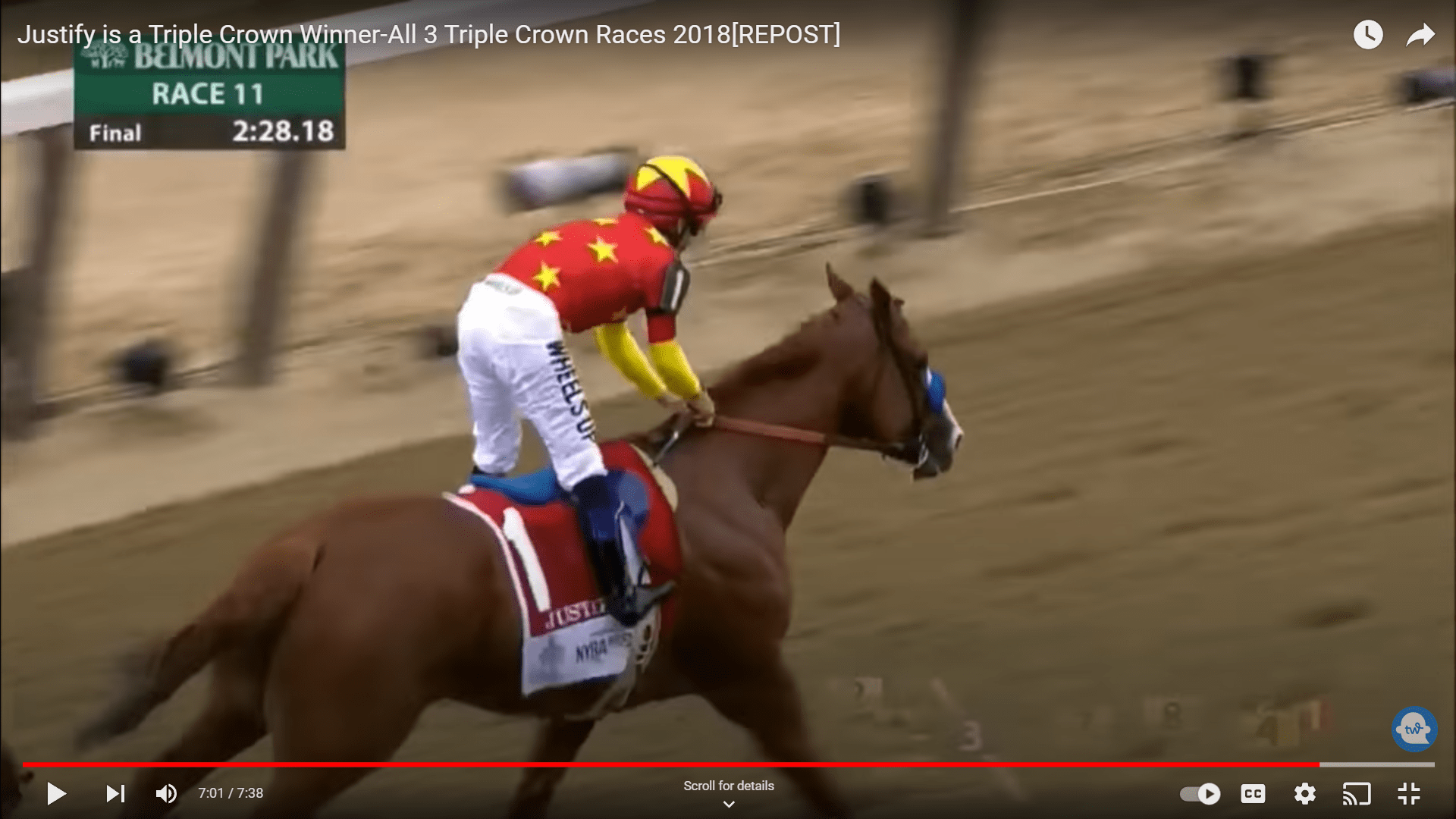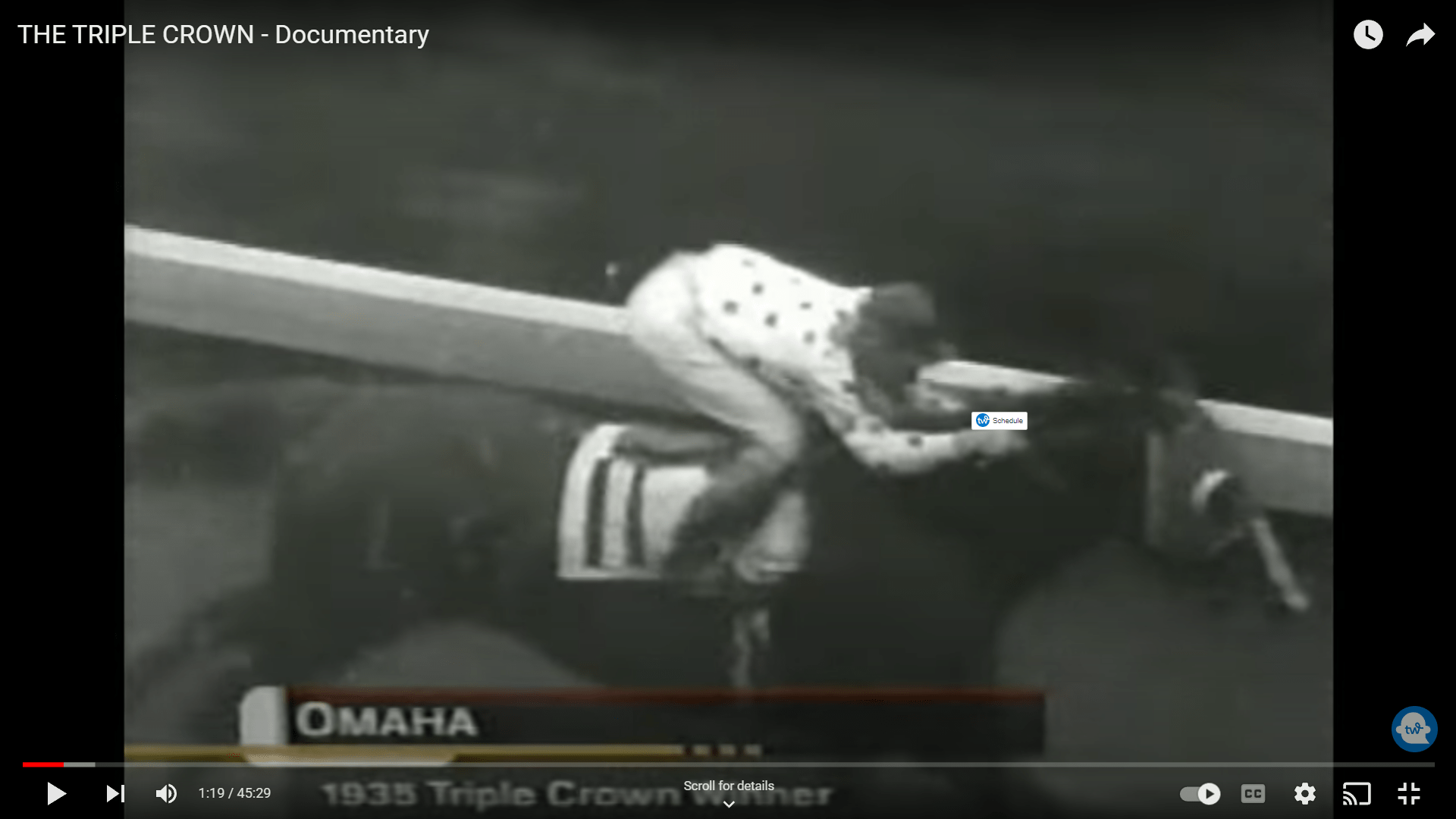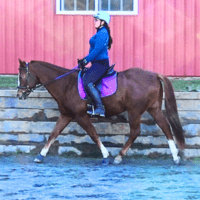Horse racing has been a part of American culture for over a century, but the Triple Crown races hold a special significance. They’ve captured the public’s imagination like no other race series.
These races are not just steeped in tradition but represent the ultimate achievement for three-year-old thoroughbreds. It’s truly a remarkable feat to win all three of these races.
Come join us as we delve into the history, excitement, and drama that make the Triple Crown horse races the most anticipated events in the horse racing calendar.
The captivating world of equestrian racing has fascinated millions of people worldwide for a very long time.
From the early days of the sport in ancient Greece and Rome to the modern-day spectacle of the Kentucky Derby, Preakness Stakes, and Belmont Stakes, horse racing has remained one of the most beloved and enduring pastimes in human history.
One of the most prestigious events in horse racing is the Triple Crown. This title is given to a horse that wins three of the most famous and challenging races in America: the Kentucky Derby, the Preakness Stakes, and the Belmont Stakes. Only a handful of horses have ever achieved this incredible feat, making it one of the most difficult accomplishments in sports.
In this article, we’ll look more closely at the history of the Triple Crown, the three races that make it up, and some of the most famous horses that have ever won this prestigious title.
The History of the Triple Crown
The term Triple Crown was first used in the 1930s to describe the challenge of winning all three races, but the races themselves have been around much longer.
The Kentucky Derby, the first race in the Triple Crown, was first run in 1875.
The Preakness Stakes, which is the second race in the series, was first run in 1873.
The Belmont Stakes, the final race in the series, was first run in 1867.
It wasn’t until Sir Barton won all three races in 1919 that the term Triple Crown was first used to describe the achievement.
Since then, only thirteen horses have won the Triple Crown, with the most recent winner being Justify in 2018.
“The Triple Crown is the ultimate challenge for any horse and trainer. It’s a test of speed, endurance, and agility, and only a few horses have ever been able to accomplish it.”
– Bob Baffert, Hall of Fame horse trainer
The scarcity of Triple Crown winners has made the achievement all the more special, and each year, the world of horse racing eagerly awaits to see if a new horse will join this exclusive club.
The Three Races of the Triple Crown
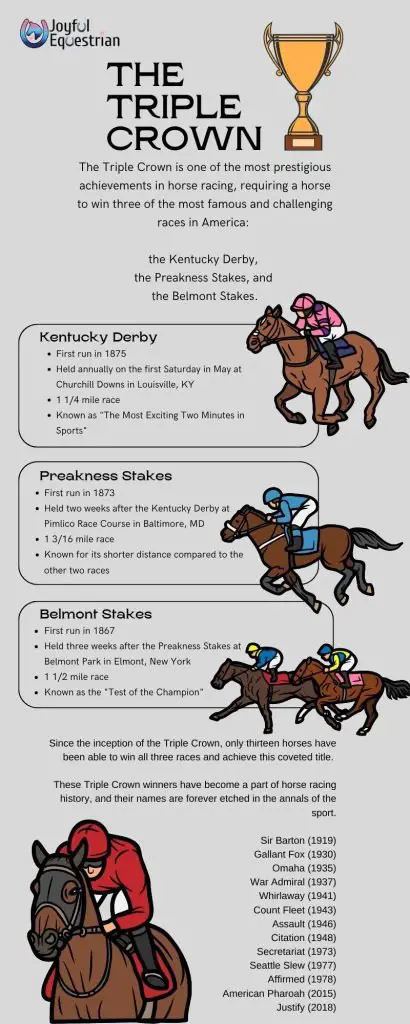
The Triple Crown consists of three races, each with its own unique history and challenges.
Kentucky Derby

It’s the first Saturday in May, and you know what that means, folks. Time to break out your fancy hats and mint juleps because it’s time for The Kentucky Derby!
This race is not just any horse race. It’s the one and only “Most Exciting Two Minutes in Sports,” and it’s held annually at Churchill Downs in Louisville, Kentucky. If you’ve never been, let me tell you, it’s an experience like no other.
Let’s dive into the rich history and traditions of The Kentucky Derby. Did you know that this race has been run every year since 1875? That’s over 140 years of non-stop excitement. And the fashion? Iconic is an understatement. It’s like the Met Gala, but for horse racing.
But let’s not forget the real reason we’re all here: the race itself. The Kentucky Derby is a 1 1/4 mile race, and it’s open to the best three-year-old thoroughbreds from around the world. These horses are the cream of the crop, and they’re here to prove themselves on the biggest stage in horse racing.
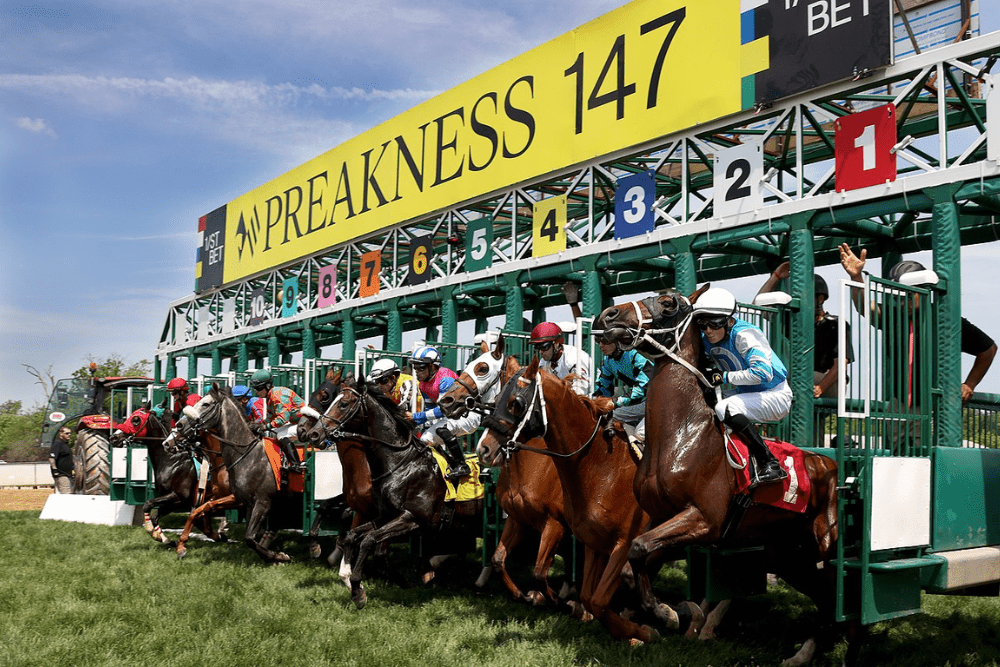
Preakness Stakes
The Preakness Stakes, an event steeped in history since 1873, holds a special place in the hearts of racing enthusiasts worldwide, standing tall as the second oldest race in the famed Triple Crown.
On the day of the race, the atmosphere buzzes with excitement, evoking a joyous and lively spirit. With unparalleled pre-race festivities and tailgating, fans eagerly await this day from all corners of the globe.
The Preakness Stakes, is held at the Pimlico Race Course in Baltimore, Maryland, and is the second of the Triple Crown races. It takes place two weeks after the famous Kentucky Derby race.
Despite being slightly shorter than its predecessor, measuring 1 3/16 miles, the grueling test of endurance and speed remains a true challenge.
Year after year, the Preakness Stakes has maintained its tradition as the second oldest race in the Triple Crown, bringing a festive atmosphere to the crowds that gather for the race.
With pre-race parties and tailgating, the event feels akin to a Super Bowl of horse racing – only with even more elaborate and interesting hats.
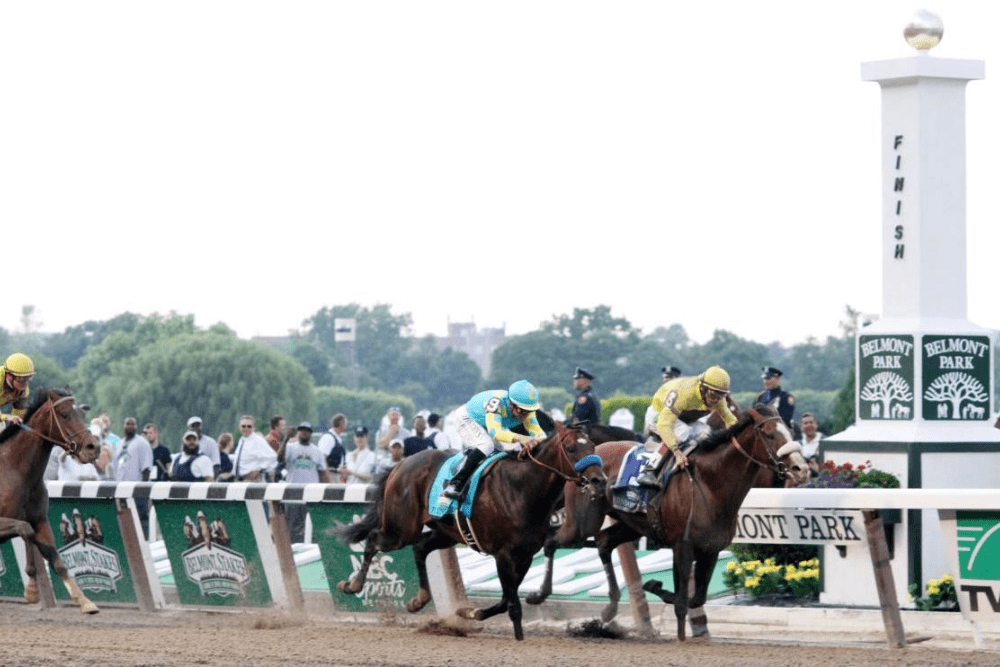
Belmont Stakes
The prestigious Belmont Stakes, the final and longest leg of the Triple Crown, awaits every thoroughbred seeking to etch their name in the annals of history.
Hosted at the challenging Belmont Park in Elmont, New York, three weeks after the Preakness Stakes, the race demands resilience, fortitude, and a will to succeed- earning it the moniker, “Test of the Champion”.
Since 1867, the Belmont Stakes has been a staple in the Triple Crown, setting the bar for horse racing around the globe.
The arduous 1 1/2 mile length of the race, combined with the notorious challenge of the track’s unforgiving terrain, has resulted in countless breathtaking upsets over time.
This has transformed it into an authentic trial of one’s abilities and stamina.
Through these three intense races, the Triple Crown pushes the limits of the finest three-year-old thoroughbreds, evaluating their speed, stamina, and spirit- distinguishing the greats from the rest.

The Triple Crown Winners
Since the inception of the Triple Crown, only thirteen horses have been able to win all three races and achieve this coveted title.
The legacy of horse racing is immortalized through Triple Crown champions, whose names are indelibly inscribed in the annals of this beloved sport.
Here are the thirteen Triple Crown winners in chronological order:
| Year | Horse | Notable Qualities |
|---|---|---|
| 1919 | Sir Barton | The first horse to win the Triple Crown, Sir Barton set the bar high for future Triple Crown winners. He was known for his powerful finishing kick and his ability to dominate his opponents in the stretch. |
| 1930 | Gallant Fox | The second Triple Crown winner, Gallant Fox was known for his versatility and ability to adapt to different tracks and racing conditions. |
| 1935 | Omaha | Owned by the legendary horse breeder and businessman Samuel Riddle, Omaha was known for his smooth stride and his impressive record on the racetrack. |
| 1937 | War Admiral | The son of the legendary racehorse Man o’ War, War Admiral was a dominant force on the track and was known for his competitive spirit. |
| 1941 | Whirlaway | A charismatic and unpredictable horse, Whirlaway won the Triple Crown with a combination of speed, stamina, and determination. |
| 1943 | Count Fleet | Count Fleet was a strong, powerful horse who dominated his opponents on the track. He won the Triple Crown with ease, setting a new standard for future Triple Crown winners. |
| 1946 | Assault | Known for his consistency and determination, Assault was a popular and beloved horse who captured the hearts of racing fans across America. |
| 1948 | Citation | One of the most dominant horses in racing history, Citation won the Triple Crown with ease and went on to win numerous other prestigious races throughout his career. |
| 1973 | Secretariat | Widely considered one of the greatest racehorses of all time, Secretariat won the Triple Crown in record time and by a record margin. His breathtaking races captivated the audience and sparked a revival in the 1970s for the sport of horse racing. |
| 1977 | Seattle Slew | Seattle Slew was known for his incredible speed and his ability to run on any surface, making him a formidable opponent in any race. Horse racing has been a part of American culture for over a century, but the Triple Crown races hold a special significance. |
| 1978 | Affirmed | The last horse to win the Triple Crown before American Pharoah in 2015, Affirmed was known for his fierce competitiveness and his ability to come from behind to win races. His battles with rival horse Alydar are legendary in the sport of horse racing. |
| 2015 | American Pharoah | The most recent Triple Crown winner, American Pharoah captivated the racing world with his smooth, effortless style and his incredible athleticism. He won the Triple Crown in dominant fashion, cementing his place in horse racing history. |
| 2018 | Justify | The most recent horse to win the Triple Crown, Justify was known for his impressive physique and his ability to perform under pressure. In just five weeks, he was able to sweep all three legs of the Triple Crown. He thereby joined the pantheon of great racehorses. |
Justify aND The Triple Crown
Unsuccessful Bids at the Triple Crown
While winning the Triple Crown is an impressive achievement, many horses have come close but fallen short of the title.
Since all three events were inaugurated, as of 2022, 23 horses have won the Derby and Preakness but not the Belmont (ten of which placed).
Here are some notable unsuccessful bids:
| Year | Horse | Belmont Result |
|---|---|---|
| 1932 | Burgoo King | Did not enter |
| 1936 | Bold Venture | Did not enter |
| 1944 | Pensive | 2nd |
| 1958 | Tim Tam | 2nd |
| 1961 | Carry Back | 7th |
| 1964 | Northern Dancer | 3rd |
| 1966 | Kauai King | 2nd |
| 1968 | Forward Pass | 2nd |
| 1969 | Majestic Prince | 2nd |
| 1971 | Cañonero II | 4th |
| 1979 | Spectacular Bid | 3rd |
| 1981 | Pleasant Colony | 3rd |
| 1987 | Alysheba | 4th |
| 1989 | Sunday Silence | 2nd |
| 1997 | Silver Charm | 2nd |
| 1998 | Real Quiet | 2nd |
| 1999 | Charismatic | 3rd |
| 2002 | War Emblem | 8th |
| 2003 | Funny Cide | 3rd |
| 2004 | Smarty Jones | 2nd |
| 2008 | Big Brown | Did not finish |
| 2012 | I’ll Have Another | Scratched |
| 2014 | California Chrome | 4th (tied) |
These horses, and many others like them, have come agonizingly close to winning the Triple Crown but fell just short.
The addition of this element further amplifies the intrigue and exhilaration surrounding this momentous athletic spectacle.
Triple Crown Records and Statistics
The Triple Crown races have produced some of the most impressive performances and records in the history of horse racing.
Here are some notable records and statistics associated with the Triple Crown:
| Record/Statistic | Details |
|---|---|
| Fastest Kentucky Derby Time | 1:59.40, set by Secretariat in 1973. Secretariat also holds the record for largest margin of victory, winning by 2 1/2 lengths. |
| Fastest Preakness Time | 1:53.00, set by Secretariat in 1973. Secretariat also holds the record for largest margin of victory, winning by 11 1/2 lengths. |
| Fastest Belmont Time | 2:24.00, set by Secretariat in 1973. Secretariat’s performance in the Belmont is widely considered one of the greatest races in the history of horse racing. |
| Most Wins by a Jockey | Eddie Arcaro and Bill Hartack hold the record for the most wins by a jockey in the Triple Crown races, with five each. Other notable jockeys with multiple Triple Crown wins include Gary Stevens, Kent Desormeaux, and Mike Smith. |
| Most Wins by a Trainer | James E. Fitzsimmons holds the record for the most wins by a trainer in the Triple Crown races, having trained both Gallant Fox and Omaha to Triple Crown victories in the 1930s. Other notable trainers with multiple Triple Crown wins include Ben A. Jones, Woody Stephens, and Bob Baffert. |
| Most Wins by an Owner | Calumet Farm holds the record for the most wins by an owner in the Triple Crown races, having won a total of eight Triple Crown races between 1941 and 1958. Other notable owners with multiple Triple Crown wins include Belair Stud, Meadow Stable, and Zayat Stables. |
| Most Starts in the Triple Crown Races | Citation, owned by Calumet Farm, holds the record for the most starts in the Triple Crown races, running in all three races in 1948 and winning all three. Several other horses have started in all three races multiple times, including Northern Dancer, Alydar, and Bet Twice. |

The Significance of the Triple Crown
The Triple Crown is an elusive and highly coveted title in the world of horse racing. It is awarded to a three-year-old Thoroughbred that emerges victorious in the Kentucky Derby, Preakness Stakes, and Belmont Stakes, all in a single season.
The significance of the Triple Crown goes far beyond the physical prowess of the horse; it also lies in the mental fortitude required to withstand the immense pressure and attention that accompanies the title.
The three races are held at varying distances, each presenting a unique set of challenges and obstacles to overcome.
To achieve the prestigious Triple Crown title, horses must conquer three challenging races, an accomplishment that only a rare few have attained throughout the history of horse racing.
In fact, the most recent winner, Justify, broke a 37-year drought since the last Triple Crown victory by American Pharoah in 2015.
Aside from its rarity, the Triple Crown holds cultural and historical significance as well. The races are deeply ingrained in American culture, attracting large crowds of spectators and significant media coverage.
The Kentucky Derby, in particular, is a celebrated event with unique traditions like playing “My Old Kentucky Home” and wearing elaborate hats.
The Triple Crown’s contribution to making horse racing a cherished and time-honored sport in the United States cannot be overstated.
Horses that achieve the title become instant legends and generate interest from casual fans and newcomers alike.
The Triple Crown also attracts considerable investment and sponsorship from corporate entities, further solidifying its status as one of the most prestigious awards in all of sports.

Controversies and Challenges Related To The Triple Crown
In spite of the Triple Crown races’ high status in the industry, they have a complicated history riddled with controversy.
Let’s investigate a few of the most pressing concerns that have cropped up with the Triple Crown over the years.
Safety and Welfare Concerns
The well-being of the horses is a major concern for the Triple Crown events.
The Triple Crown events have not been immune to the rising concern over the frequency of injuries and fatalities in horse racing in recent years.
It has been alleged that the races put too much strain on the horses and are held in dangerous or unfair conditions.
To ensure the safety of the horses, some have advocated for greater control and regulation, while others have advocated for the elimination of horse racing altogether.
Performance-Enhancing Drugs
The widespread usage of PEDs by both horses and trainers has been a controversial subject throughout the Triple Crown races.
In spite of stringent restrictions that prohibit the use of PEDs in horse racing, there have been numerous examples recorded of horses testing positive for prohibited substances either before or after the races.
This raises questions about the legitimacy of the competition.
Critics argue that PEDs give some horses an unfair advantage, and that the current testing and enforcement system is inadequate to catch all offenders.
It has been suggested that PED users should face harsher punishments, while others have advocated for preventative measures.
Financial Issues
Another challenge facing the Triple Crown races is financial in nature.
While the races generate significant revenue for the horse racing industry, there are concerns about the long-term sustainability of the sport.
In recent years, attendance and wagering at the Triple Crown races have declined, as younger generations have shown less interest in horse racing and as competition from other forms of entertainment has increased.
Additionally, there is concern about the cost of breeding and training horses for the races, which can be prohibitively expensive for many owners and trainers.
Calls for Reform
Given the various controversies and challenges facing the Triple Crown races, many stakeholders have called for reforms to the way the races are run and regulated.
Some people have proposed modifying the structure of the races by, for example, shortening the amount of time each race lasts or switching the order in which they are competed in.
Others have called for stricter regulations and oversight of horse welfare, drug testing, and other issues.
Others have suggested that the Triple Crown races be modified or eliminated entirely in light of the numerous challenges confronting the horse racing industry as a whole.
No matter what happens, the Triple Crown races will remain controversial among horse racing enthusiasts, industry insiders, and outside observers.
Public Perception
The controversies and challenges surrounding the Triple Crown races have also had an impact on public perception of the sport of horse racing.
In recent years, there has been increasing public interest in learning more about the treatment of horses in the racing industry.This is especially true after high-profile events like the deaths of several horses at Santa Anita Park in California in 2019.
Critics say that the Triple Crown races and other big horse racing events care more about making money than about the horses. They say that the sport needs to do more to make sure the horses are safe and healthy.
The Future of Horse Racing
Some people seem to be afraid that horse racing is losing popularity and that it will soon be eclipsed by other types of entertainment.
However, others remain optimistic and believe that horse racing can adapt to the times and evolve to meet the demands of a new generation.
The future of the Triple Crown and horse racing as a whole will depend on a handful of circumstances.
The industry will need to navigate a complex web of regulatory requirements and stay abreast of advances in veterinary medicine and animal welfare practices.
Moreover, it must cultivate a connection with fresh audiences and ensure that it remains relevant in a constantly changing landscape.
Triple Crown Documentary
FAQs About The Triple Crown
-
What qualifies a horse for the Triple Crown?
These races are only open to 3-year-old Thoroughbreds where colt or filly.
Each horse must be nominated to compete in these races.
Every horse that runs in the Kentucky Derby has a shot at the Triple Crown.
To qualify for the Kentucky Derby, points are awarded to the top four finishers in each prep race.
Ultimately, the 20 horses with the most points earn the right to a spot in the Kentucky Derby.
-
Where are the 3 Triple Crown races at?
The Kentucky Derby is held at Churchill Downs in Louisville, Kentucky.
The Preakness Stakes is held at Pimlico Race Course in Baltimore, Maryland.
And the Belmont Stakes is held at Belmont Park in Elmont, New York.
-
How many times can a horse run in the Triple Crown?
A horse can only run for the glory of the Triple Crown once. This is because it is once per year and the horse must be a 3 year old.
-
What was the cheapest horse to win the Triple Crown?
The cheapest horse to win the Triple Crown was Sir Barton, who was purchased as a yearling for just $10,000. He went on to win the Triple Crown in 1919, becoming the first horse to achieve this feat.
Seattle Slew was the second cheapest Triple Crown winner. He was sold at auction for $17,500 and went on to win the Triple Crown in 1977.
-
Who is the youngest person to win the Triple Crown?
The youngest person to win the Triple Crown as a jockey was Steve Cauthen, who was just 18 years old when he rode Affirmed to victory in 1978.
-
What is the oldest Triple Crown race?
The Belmont Stakes is the oldest of the three Triple Crown races, having been first run in 1867.
-
Is there an age limit for the Triple Crown?
Yes, there is an age limit for the Triple Crown. The Triple Crown of Thoroughbred Racing is a series of horse races for Thoroughbreds, often restricted to three-year-olds.
-
Is the Triple Crown rare?
Seeing as it is 2023 and the Triple Crown was first awarded in 1919 and since then only 13 horses having the Triple Crown.
I would say, yes, winning the Triple Crown is quite rare.
-
What happens when a horse wins the Triple Crown?
When a horse wins the Triple Crown, they become an instant legend in the sport of horse racing.
Winning the Triple Crown earns a horse significant prize money, with the 2021 Belmont Stakes offering a purse of $1.5 million and the winner receiving $800,000. Owners also gain prestige and a place in racing history. T
he Triple Crown Trophy is a silver award for the winner of the Triple Crown of Thoroughbred Racing.
Justify’s Triple Crown victory resulted in a $75 million breeding deal, demonstrating the potential for increased value.
-
How fast do Triple Crown horses run?
The speed at which Triple Crown horses run varies depending on track conditions, weather, and the abilities of the individual horses.
Their speed also changes throughout the race. They don’t keep the same pace the whole time.
To put it in perspective, most horses can’t run faster than 25 mph.
The horses in the Triple Crown average speed around 30-34 mph.
But some reach peak speeds of 38.
-
Can female horses run in the Triple Crown?
Yes, female horses can compete in the Triple Crown races, but they have historically been less successful than their male counterparts. Only one filly, Winning Colors, has won the Kentucky Derby, and no filly has ever won the Preakness or the Belmont.
-
Why is the Triple Crown so hard to win?
The Triple Crown is difficult to win because it requires a horse to be at the top of their game for three races in a row, with each race having unique challenges and demands. The physical and mental stress of competing in three high-stakes events
-
How long has the Triple Crown been in existence?
The term “Triple Crown” was coined by sportswriter Charles Hatton in 1930 after Gallant Fox won all three races. The title was officially recognized in December 1950 and awarded to Sir Barton, who won all three races in 1919.
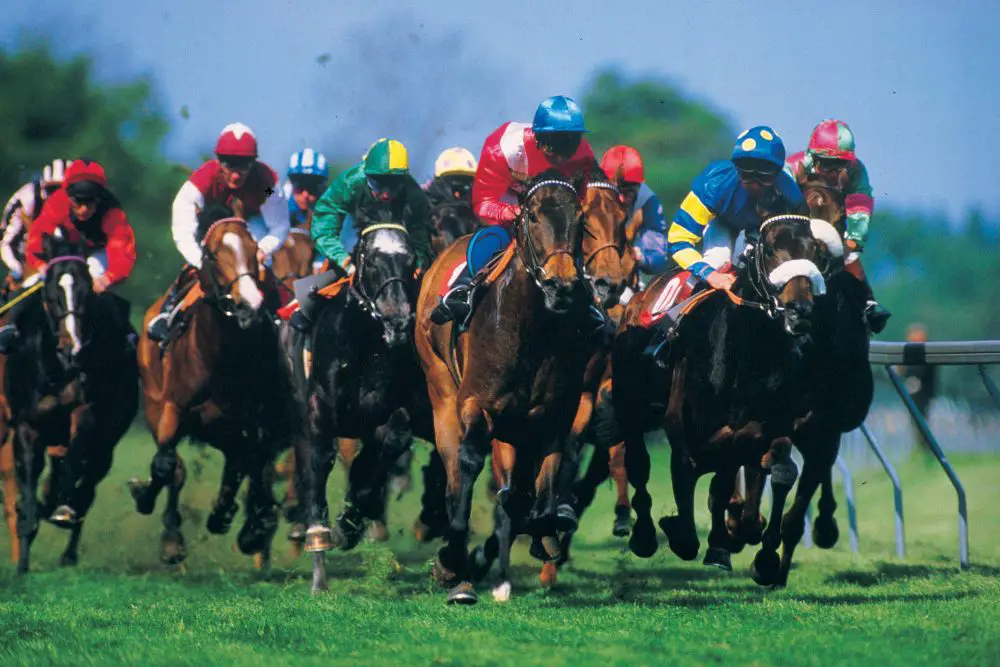
Conclusion
Horse racing, an integral part of American history, has captivated the hearts and minds of countless enthusiasts.
The Triple Crown races stand as a testament to this enduring passion, honoring both the sport’s rich heritage and its continued magnetic appeal.
From the excitement and glamor of the Kentucky Derby to the grueling endurance test of the Belmont Stakes, these races represent the pinnacle of achievement for three-year-old thoroughbreds.
With only thirteen horses having ever won the Triple Crown, this rare and difficult feat remains one of the most sought-after goals in horse racing.
Each year, fans around the world watch in anticipation to see if a new horse will join this exclusive club, adding to the lore and legacy of this historic sporting event.
For those who are interested in learning more about the Triple Crown races, be sure to check out our website for more information.
And don’t forget to share your thoughts and stories about the Triple Crown races in the comment section below!
Cheers, Kacey
P.S. Did you like this article? Gallop over to:

